Camille Moffat was driving home late one night when she was hit head-on by a drunk driver. She suffered multiple fractures, a traumatic brain injury, and doctors thought that she might never walk or speak again. However, through a series of miracles, Camille relearned how to walk, and has retained her sense of wit, style, and intelligence. She loves to tell her story about God’s hand in her life and the lessons she has learned about God’s love for all of His children. Camille exudes radiance, hope, and optimism for the future, not only for herself but for all who come into contact with her.
Tell me a little bit about yourself. Where did you grow up and where did you go to school?
I always tell people I’m from the East Coast, but specifically I was born in Boston and went there for elementary school, then moved to Jersey for middle school, and did high school in Philly. Roughly those timelines. I went out to BYU where I got a degree in the very lucrative field of Art History and Curatorial Studies. But I loved it, because anywhere you travel, you find something you know and recognize, and it makes everything that is broad and expansive feel more intimate.
What did you do after graduating from BYU?
After BYU, I did a summer program at Cambridge University, which was awesome. I loved living in England. Then I moved to Washington, DC. I lived there a couple of years where I worked for an attorney, and then for a startup nonprofit (which was very, very busy). The busyness of it all made me decide that I wanted to go back to school at some point, and I moved back to Utah to study for the GMAT and GRE. But then I didn’t get into grad school, which was surprising to me honestly. I thought I had decent scores and that I looked good for a number of reasons, and then in addition to that, I had good networking opportunities, but it just didn’t work out.
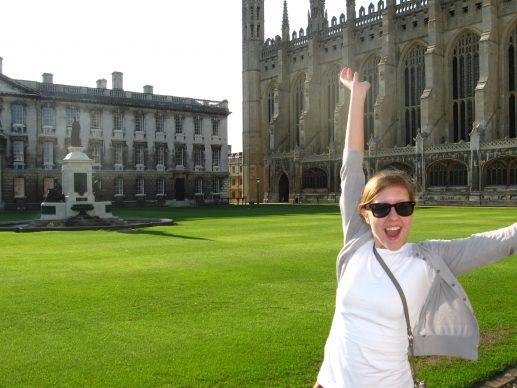
Camille Moffat
Could we talk about the grad school disappointment for a little bit? That would be hard. How did you process that?
I was surprised, and a little ashamed. I didn’t tell my parents for a week that I didn’t get in, because I didn’t want to disappoint them.
And you were living with your parents at the time?
Yeah, I had moved out to Utah where they had recently moved. I had never expected to move back home. In fact, when they moved back to Utah, I was like, “See you never, Mom and Dad. My life is perfect here in D.C.”
So what brought you to Utah? Why did you feel you had to move?
Ultimately, I just felt like I should. The plan was to live with them only a little bit, and then on to school, either out of state or out of country, or just another part of the state. So not getting into grad school was kind of hard. I felt like, “Why did I feel like I needed to move out here? What’s the point?” I thought that maybe I just wasn’t meant to go to grad school, and I had misinterpreted the feeling I had. I thought, well, maybe I’m just not as smart as I thought I was. It changed my self-definition a little bit. But it all worked out in the end. It allowed me to re-evaluate and look at programs I was actually interested in.
I think it’s really interesting that you said the disappointment “changed your self-definition,” because I feel that happens to all of us at multiple times in our lives. How would you describe yourself when you were in D.C. versus when you were in Utah?
I would describe myself in D.C. as the top of my game socially. I had a fine job, and a lot of really fulfilling social and cultural opportunities. I had a lot of enriching friendships that—to use the familiar term—“filled my bucket.” I never thought I would leave, because things were perfect. I was so fulfilled in every aspect of my life when I was there.
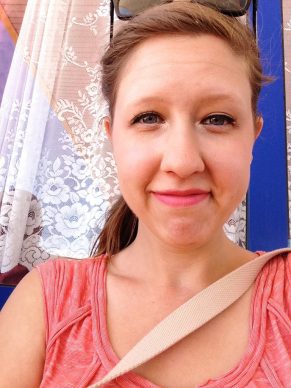
Camille Moffat
So when you were living in Utah, you didn’t feel like yourself as much, and then you got into a life-changing accident. What happened that night?
I don’t remember any of December of 2016 or January 2017. The accident was on December 17th, 2016 at 12:03 in the morning. So it’s true what they say, everything bad happens after midnight.
December 17th was a Saturday morning. That Friday I had been at work and then went out with some friends. When I was driving home, I got off the exit to get to my house, on a one-way stretch of road. I was going the correct speed and direction, when a guy in an SUV hit me head on going the wrong way at 100 mph.
100 mph?!
He just plowed into me. And he had been going the wrong way for over a mile.
How were you found?
A lot of people were coming back to Bountiful from the Jazz game on US-89, including a guy who had been working at the game. I don’t want to delve too much into his personal story without talking to him, but he was the one who called 9-1-1. They didn’t know how to immediately respond, because I was within 5 feet of the county line. You can see the sign about 5 feet away from where I hit that says, “Now entering Davis County” as opposed to “Entering Salt Lake County.” The police were wondering who to send. And the gentleman who called said, “I don’t care who you send, send everybody, she’s dying or dead.” The police came and had called Life Flight. Since then I’ve talked with the officer who was at the scene, and he said he almost called Life Flight to tell them to go away, because there was no one to save, I was already dead. Luckily Life Flight made it and took me to the hospital.
How did your parents react?
About 1:20 in the morning, so an hour and 17 minutes after the accident, my parents got a call. And the fact that they even heard their phones was a total miracle. My dad is a classic workaholic, used to be an executive on Wall Street, always working. But he had left his phone in his office instead of up by him, so they tried to call him first, and he didn’t answer. My mom’s phone was on “Do Not Disturb,” since it was the middle of the night, but the call went through on the first ring. My mom answered it and they immediately got in the car and drove to the hospital.
When they got to the hospital, they walked in and asked where I was. My dad said, “Where is Camille? Has she expired? You can tell me, I can handle it.” They took them back into the room where I was, and my parents saw a neck brace on me and several doctors in the room, which told them I was alive.
How long were you in the hospital?
I spent the next three weeks in the ICU. The average stay in the ICU is 3.3 days and the average survival rate is 50%. I obviously sustained a lot of trauma in the event, and it’s easiest if I do this from head to toe, so bear with me as I do this—I’m getting a lot better at remembering everything.
I had several brain bleeds. If you have one brain bleed, it’s not great, but it’s workable, they can manage that. If you have three brain bleeds, it’s a red alert. I had 15 bleeds in my brain. So essentially my skull was full of blood. My little brother is a chemical engineer and he did the math and said that with how fast the gentleman who hit me was going, and how fast I was going, my brain subsequently went 18 Gs, which is faster than an astronaut returning to Earth. People say that an Art History degree can’t get you anywhere, but it took me to space in my mind!
My brain injury is called a traumatic brain injury (TBI). There are a couple interesting things about traumatic brain injuries. The harder you get hit, the less likely you are to get headaches. I had suffered from chronic migraines my entire life—I’d get anywhere from 2-8 migraines a month. Neurologists didn’t know why, it was just my fate in life. But now I don’t get headaches anymore, so I’m really excited about that—it’s fantastic. But there are, obviously, negative side effects. My TBI side effects include that my short-term memory’s not as good. Sometimes I forget words.
Moving down from my head, I broke my nose in the accident. Additionally, I lost my four front teeth. At the time I had adult braces. It ended up being a good thing I had them on because they kept so many of my teeth in place.
We found out on Christmas Day that my intestines were perforated. They had to do two surgeries for that. One on Christmas and then 2 days later they opened me up again. They ended up taking out a foot of my intestines. I think a lot of people know this already, but you have 22 feet of intestines. So if you lose a foot, it’s not a big deal. Now I have this scar that I think is hideous, but my dad says, “Camille, it means you’re alive.” But I had good abs, so I’m vain about that. I broke my right foot but I shattered both ankles. One of the ankle bones was shattered into 50 pieces. There’s no way you can superglue it back together, so they ended up grafting a piece of bone from right above my knee, and that became my new ankle.
During 2017, I had 8 surgeries in total. 5 or 6 of those were in the hospital.
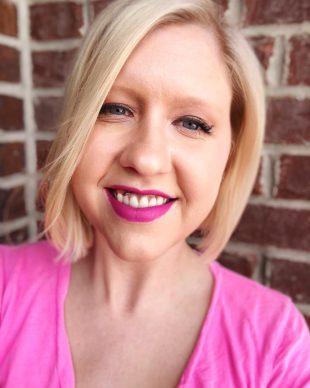
Camille Moffat
That is a lot of physical trauma. What was therapy like?
Therapy was amazing. I had never had that sort of therapy before. I had had emotional therapy before, but now I had physical therapy, occupational, and speech therapy. Typically I would do 3.5-4 hours of therapy a day. But I do remember a day where I would do seven hours of therapy in a day. It’s pretty exhausting. Some of my therapy was learning how to navigate things in my wheelchair. They would time me to see how fast I could go around the floor in my wheelchair. Then I learned how to transfer from the wheelchair to the toilet, to the shower, and things like that. One of my dad’s favorite stories about me growing up is that in 10th grade we had to do an assignment for biology where we had the measure our bicep when we were not flexing, measure when we were, and then take the difference and calculate something. But I raised my hand and asked my teacher, “Mr. Del Prado, what do I do if there’s no difference between when I’m not flexing and when I am?” I only mention this to say that as a result of me being in a wheelchair, I had some pretty nice biceps for awhile. I never thought I’d be capable of getting any muscle there.
I remember my occupational therapist, Josh, taking me on a couple of field trips outside of the hospital. My first field trip was to Barnes and Noble and I was so excited. He gave me challenges to do like finding books. That challenge alone gave me so much more compassion and empathy. I never would have thought about someone in a wheelchair not being able to see the titles of books on higher shelves very well. It opened my eyes.
I left the hospital in two months. They expected me to be in the hospital anywhere from 6-9 months, so getting out in two was amazing. It was miraculous, honestly. They told my parents I would probably never speak coherently again, but science didn’t factor in the fact that I’m a Moffatt, and you cannot get my family to shut up. It’s impossible. We love to talk. They also said I’d probably only get 50-70% of my mental faculties back, if I was lucky. I’d just like everyone to know that I’m still perfectly aware that 2 plus 2 equals 4, and I can spell my name.
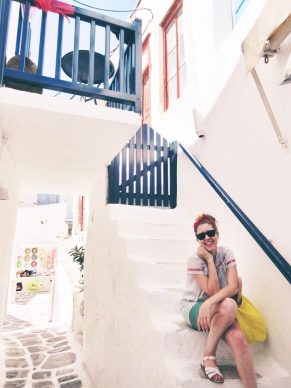
Camille Moffat
You also remembered and spoke in French for a time, right?
[Laughs] Oh yeah. In the ICU, there was a time when I refused to listen to or speak English. Everything had to be in French. I had taken about ten years of French growing up, and my dad speaks fluent French. I hadn’t studied French for seven years. But when your head gets knocked around and you start coming back, you want certain things. My dad would have to translate to the doctors what I was saying in French and then translate what they were saying to me. There are only two things I wish: 1) That I had woken up speaking in a British accent permanently, or 2) that I had woke up speaking some kind of unheard-of North Korean dialect.
Your parents sound like superstars during all of this.
My parents were awesome. They still are awesome. They’ve been supportive through this whole thing. They remodeled the entire first floor of the house so that everything was wheelchair accessible. This was especially helpful since I still had to do a ton of physical therapy outside of the hospital.
How did you learn to walk again?
I learned to walk in a swimming pool. The reason you learn to walk again in a swimming pool is so that it displaces your body weight. When I was a little girl, I took my first steps at the Sacred Grove, so this time around, I decided to keep on theme and take my first steps outside the pool (and without my boots) on the grounds of Temple Square. I like parallel structure.
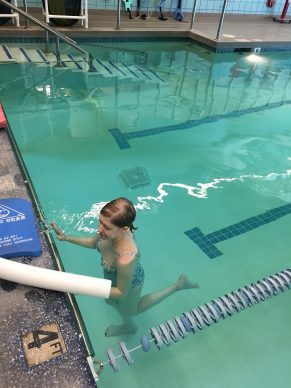
Camille Moffat
Your story is a lot about physical healing, but spiritual healing as well, I’m sure. Can you tell me a little bit about that?
I would never want anyone to go through what I had to go through, I just want everyone to know what I know. But I guess that’s not how the refiner’s fire works. Basically, I don’t have faith anymore, I just have knowledge. I know that God is real and so is Jesus Christ. I would not be here without Them. I would not be here without my amazing doctors who have these amazing God-given talents and who didn’t bury their talents in the ground, but further developed them so Christ could bless them with more.
I felt a lot of support on both sides of the veil. About two weeks before my accident, my mom had been invited to go to a fireside given by Sister Wendy Nelson, President Nelson’s wife. Sister Nelson talked a lot about how we’re told that we can pray for angels in our lives, but that we can pray specifically for angels by name, and that our ancestors are our angels. My mom said that on the way to the hospital she was praying for specific ancestors to be with me. The veil was very thin in the hospital room, and my parents could feel the presence of God there. They also said that I would openly converse with ancestors, and that there were some very special experiences associated with that. My parents talk about how at the beginning I had no veil. I just was in God’s presence and it was very apparent in what I was saying and what I was doing, and that they could see the veil coming down and how frustrated I would get. So I guess that’s what I mean when I said that I don’t have faith, I have knowledge, because we all have that knowledge, we just can’t remember it. And again, I can’t remember it now, but my parents were able to be there to witness it and tell me.
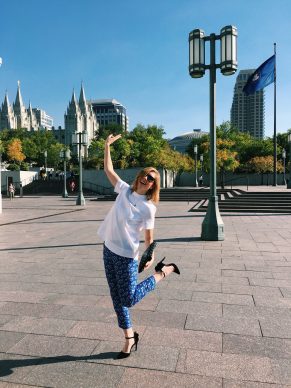
Camille Moffat
Thank you for sharing that. What do you think one of the most important things is that you have learned from this experience?
Honestly, that God loves us. When I heard those scriptures that say, “God is not a respecter of persons,” I thought, “Okay, I get it. God doesn’t love Mitt Romney any better than me because he’s famous and Mormon. I get it.” But I don’t know why I was so dense. I think everyone else realizes this, but Heavenly Father really does look out for us regardless of how “ordinary” we might be. We all are lost sheep and he does care for all of us and wants all of us to succeed. Don’t get me wrong, I think I’m an awesome person and that everyone should be as obsessed with themselves as I am with myself. But I think we all are amazing, because we are children of our Heavenly Father. And when we know that, that’s pretty empowering. God still loves me, even though He’s aware that I’m a pretty normal person. I just want everyone to feel that way—to know how awesome they are, no matter how “normal” we may be. Nobody is just “normal.” We are divine.
I think that’s hard for a lot of us to feel. We can know it intellectually and sing it in “I am a Child of God,” but you can’t force someone feeling that way. They have to come to know for themselves.
Exactly. You know, I went to teach Young Women’s in my parents’ ward a couple of weeks ago. And I was really struck by the YW theme and how powerful it is. It talks about all these values we have, and again, to me it circles back to the idea that everything is so simple in the Gospel. Obviously there’s a lot things that seem heavy, but I think that just comes from mankind having an incomplete knowledge as part of this earth life. We’re not omniscient. We don’t have all the knowledge and so our time here doesn’t seem so simple. But the things we do have knowledge of are really simple. God loves us and wants us to be with Him and He’s telling us how to be with Him.
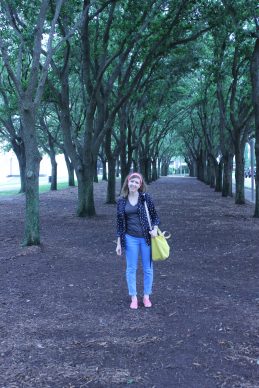
Camille Moffat
I love that. Thank you. So there were two other themes I wanted to talk with you about. One, the topic of forgiveness—I know you saw the man who hit you and faced him in court. What was the forgiveness process like?
You know, I’ve never really been angry with the man who hit me in any way. My parents said that even from the moment they saw me in the hospital I was asking, “Is he okay?” I realize this can sound very self-aggrandizing for me to say that, but I’m just trying to give an accurate account. I honestly have never felt upset with him. He had his agency just like I have my agency, and agency collides sometimes. He made a decision that didn’t need to happen, but it happened.
I met him at the sentencing hearing I went to. I didn’t get to talk to him directly, but that makes sense. I did get to see him from behind and his mug shot, but you know, he was a young guy. He was 32 when he hit me, and it’s hard for him, obviously. I can’t imagine what he feels knowing the consequences of his actions and how that’s impacted other people. And regardless of how it’s impacted other people, it’s impacted him in ways that would be really overwhelming and crippling. He’s in prison right now and I hope that while he’s in prison he can gain whatever insights he needs to be a better person and that he can carry those onto other areas of his life. Just like I hope this experience has made me a better person and continues to make me a better person, I hope the same for him. I’ve talked to people who have gone to prison for other things and they’ve talked about the different ways people can either be healed from it or choose not to become a better person, and I hope that he does choose to become a better person.
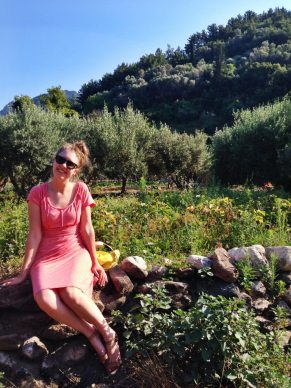
Camille Moffat
Do you feel any regret about this experience or what happened?
Honestly, I can feel nothing but positive and grateful for the experience that I’ve had. It has brought me so much closer to my family, and my testimony and my self-awareness have grown. In the end, it’s not even a silver lining. It’s like a silver blanket, it’s just everywhere. You know, there’s been so much physical pain, but I don’t feel any emotional pain about it. And I honestly don’t know what it is that has allowed that. Actually, pause, rewind. I do.
What would you say has allowed for that emotional healing?
I was talking with one of my girlfriends, and she said that she prayed for both my body and my heart to be forgiving. I thought that was such a beautiful sentiment. I don’t think I’d ever prayed for someone’s heart to be forgiving or compassionate in that sense. It’s interesting, but I’m glad you brought this up, because I had never realized that prayer has a tangible effect to it. There were moments even in that last week in the hospital that were so devastatingly difficult. There were times I didn’t know if it was possible. And in those moments I could physically feel prayers reaching out to me. And it sounds insane, I know, but it makes perfect sense. Because if God is a man with a body of flesh and bone and if God is omnipotent, then why couldn’t His power be tangible? More people than I could ever know have prayed for me during this thing. From the kids that I babysit, from my friends, to my family. That massive group effort—or even one particular effort, like my friend who prayed for my heart—got me through so much of the hard stuff. It’s so humbling. This whole experience is so humbling. I don’t know why I am here and alive. But I feel like it goes back to the whole “I’m just a normal person” thing. Honestly, I think every ordinary person can have such a force for good, even with just yourself. Because yes, it’s good that we can reach out to other people, but if we can be a force for good for ourselves and be more Christlike and dwell in His presence, if nothing else, maybe that’s why I’m here. I still don’t know the reasons for why I’m back, but I’m glad I’m here. There’s a lot of cool places I haven’t been to yet, and a lot of architecture and museums to see.
And a lot of people to meet and a lot of people who need to meet you.
Thank you. I know I am in the very rare few to have such a strong support system, both inside and outside of my family. And it breaks my heart to know there are people who go through things harder than this that don’t have the support system I’ve had. It really motivates me to be a better sister, a better friend, a better coworker. Like I said, I think I’m awesome, but I know I’m not perfect. And there are times when I don’t react as calmly as I could with certain things, like at work, but this has helped me refocus and think about how I can love people more. I thought I had a pretty good handle on that before all this, but there’s always more to learn.
For all of us, in so many things. So what are some of the lessons you’ve taken from this experience? What lessons have you learned that will help you live life abundantly?
Wow, that’s an excellent question. I’ve just learned a lot about charity. Charity has been my favorite gospel topic for many years now, since it is that pure love of Christ. I think this whole experience has helped me to become more charitable. And again, to understand that we all need to be loved and we all have our agency. We have abundant opportunities to become better people by using our agency in the small things. Just those cliché things you hear—letting someone cut you in your lane in traffic, or sitting next to someone in church who you’d rather sit next to somebody else, those little opportunities where you can use your agency to make someone else’s life better and make your life better because of that.
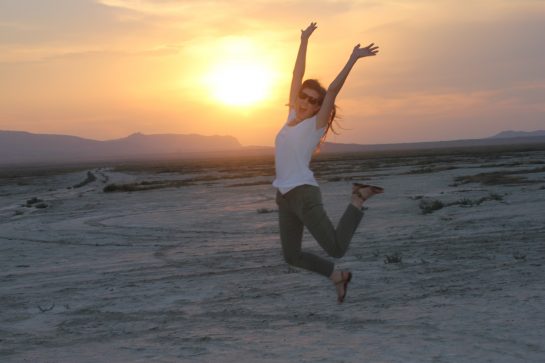
Camille Moffat
What are you looking forward to in the future?
I’m so excited about everything. I’m looking forward to starting grad school this summer—I am going to do a Master’s in Healthcare Administration at the University of Utah. I’m honestly so excited to learn more about the people who helped me so much. And then, I am so excited, because in two weeks and one day, this girl turns 30 and she’s turning 30 at the Taylor Swift concert in LA! I almost died forever without going to a Taylor Swift concert, and that is not a life I want to leave!
That is very exciting!
I’m excited about that. For the next two years, I’ll be busy with school, but after that I am planning a trip to Bath, England with a friend of mine. That’s another long-term goal. No real plans, but we have an idea. And if something happens in the meantime and I get incapacitated again, at least I went to the Taylor Swift concert. So there’s lots to look forward to, and then if nothing else happens, I’ve had an awesome life. Which sounds really macabre to say, but you know what I mean? Life’s awesome. Life has been awesome, life continues to be awesome, and the next life is going to be even better.
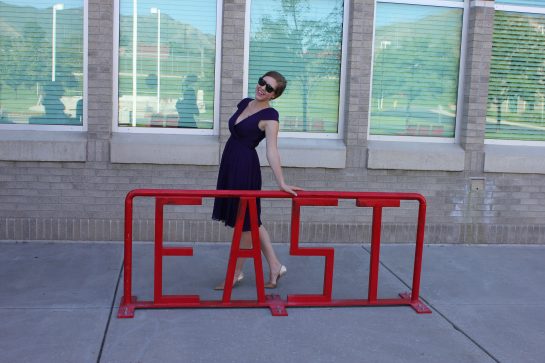
Camille Moffat
Is there anything else you’d like to share?
Just that there are so many things that have prepared me for this experience. I know that we’re not deists, but God is omniscient, and I think He prepares us for things that will either harm us or help us. Looking back, He gave me opportunities that I didn’t understand that have really prepared me to go through this experience, and I think that’s a wonderful thing. I know that there have been times when I haven’t recognized His hand, before the accident and even since the accident, but sometimes we’re lucky to see how the puzzle pieces come together.
Even if I didn’t succeed this remarkably—if I didn’t have the same recovery and success with my health that I’ve had—I’m still so happy. There’s so much to be thankful for. My eternal perspective has grown so much. Things really do just roll off my shoulders much more easily than they would have before, which is awesome. Eternity’s great, I’m sure. Things are good, life is good, our Heavenly Father is good.
Some of our moments of refiner’s fire are more visible than others. So I hope people don’t think they have to go through my same experience to have similar or better results. I just happened to have an experience that was tangible and visible. And I know there are billions of people that are going through a refiner’s fire that we can’t see, and I just want us to be charitable and compassionate towards people so we can help each other as we go through those moments, those years, those lifetimes. We’re here to help each other, and it’s easy to forget that.
At A Glance
Name: Camille Moffat
Age: 30
Location: Bountiful, Utah
Marital History: Single
Occupation: Graduate Student
Schools Attended: Brigham Young University, University of Cambridge, University of Utah
Favorite Hymn: I don’t have one favorite, but the one that comes to mind right now is Abide with Me ‘Tis Eventide
Interview Produced by Megan Armknecht
